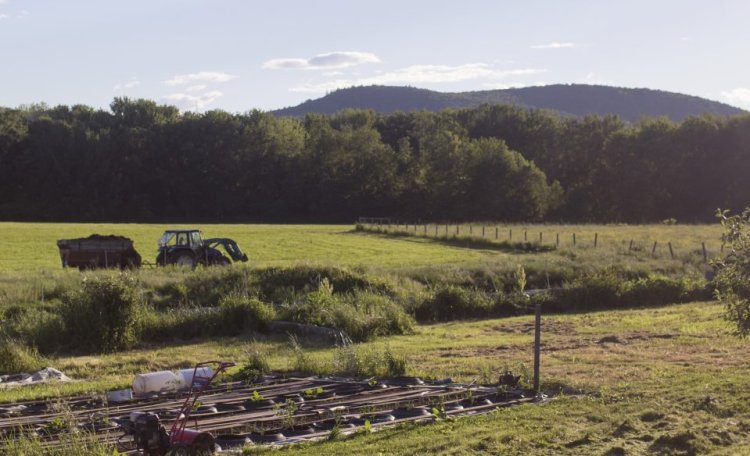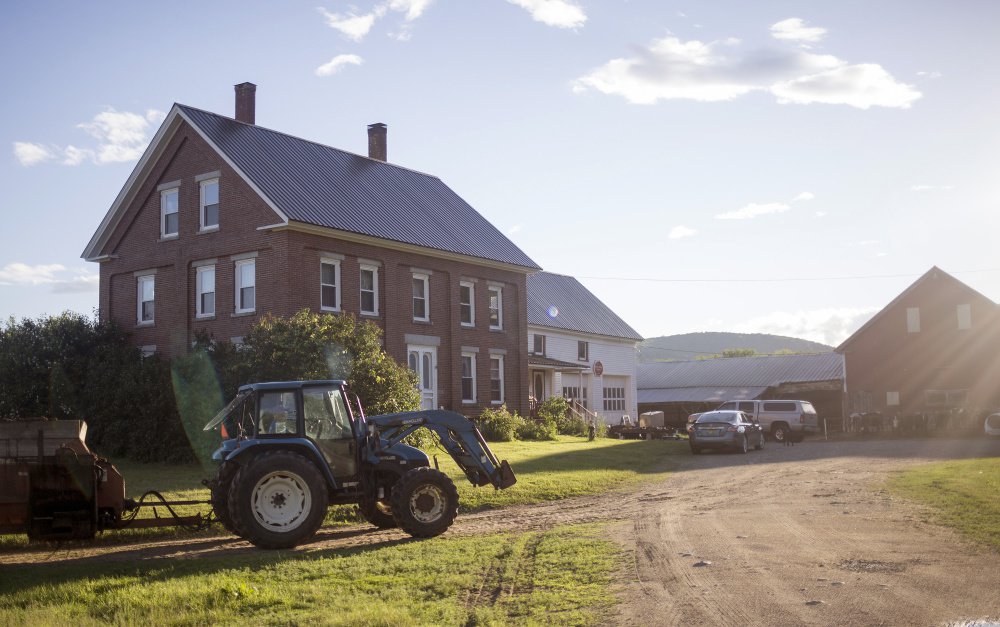Gov. Paul LePage has signed a bill into law that affirms the rights of cities and towns to regulate local food production, making Maine the second state in the nation to allow consumers to buy directly from farmers and food producers regardless of the state and federal licensing and inspections that would otherwise apply.
With the passage of the law last week, Maine becomes a leader in the so-called food sovereignty movement that promotes freedom of food choice for consumers who are willing to forgo some food safety regulations.
Food sovereignty revolves around a sort of “handshake integrity,” said Heather Retberg, a Blue Hill farmer who has been a leader in the movement. It means that a neighbor can pop by Quills End, the farm that Retberg runs with her husband, Phil, and pick up raw milk even if the Retbergs do not have that milk inspected and licensed by the state. If that neighbor trusts the Retbergs, the neighbor can buy directly from them.
If the Retbergs have veal calves and want to sell the meat directly to a consumer, they can do that too as long as the neighbor knows the story behind that milk or veal, and understands the risks involved in buying products that have not been vetted by state inspectors.
Blue Hill in Hancock County, where the movement first gained steam, is among the 20 towns across Maine that already have approved local food sovereignty ordinances. The bill that passed last week, L.D. 725, will essentially recognize the right of those towns to enforce their own food regulations, and the decisions of any other municipalities to do the same.
In 2015, Wyoming passed the Wyoming Food Freedom Act, which allows transactions among producers of what the state calls “homemade food” – produced in a kitchen that is not licensed, inspected or regulated – and “the informed end consumer.” The Maine and Wyoming laws are far from identical, but they speak to a desire for a more old-fashioned – some would say libertarian – approach to buying food.
LePage’s signature on the law proposed by Senate Minority Leader Troy Jackson, D-Allagash, came as a welcome surprise to advocates for food sovereignty.
“I ran for office because of food sovereignty,” said Rep. Craig Hickman, D-Winthrop. “Food sovereignty means that the state of Maine will recognize, at last, the right of municipalities to regulate local food systems as they see fit.”
Hickman, who also is a farmer and owner of a small bed-and-breakfast, had proposed similar legislation four times before handing the baton over to Jackson.
“Timing is everything,” Hickman said. “It seems that everything was aligned for this to happen.”
The Department of Conservation, Agriculture and Forestry, which oversees many of the inspection programs, including those for meat and dairy, said it is reviewing the legislation to determine the implementation issues that need to be addressed.
Things are unlikely to change, or change much, at farmers markets throughout the state because farmers markets are heavily insured and licensed independently from the municipalities where they are held.
“Most markets will be unaffected,” said Leigh Hallett, executive director of the Maine Federation of Farmers’ Markets.
But the Maine communities that have approved local food sovereignty ordinances can function almost as islands where a farmer can drop off a gallon of raw milk and a consumer can ask for a chunk of that delicious cheese made in an unlicensed facility.
Since 2011, when Sedgewick, population 1,200, declared itself food sovereign, the number of Maine towns passing local ordinances to take back regulatory control over locally produced food has steadily increased. And with it, so has the interest in getting affirmation from the state that there would be no interference with newly established local laws. The bill signed by the governor had the support of the Maine Municipal Association.
“Let the local people decide,” said Garrett Corbin, legislative advocate for the Maine Municipal Association. “That is kind of our mantra.”
That perturbs some in the Maine food community, who see this as a dangerous path that could put consumers at risk. The Maine Cheese Guild opposed the bill, and former president Eric Rector was one of the people who testified against it. He called the signing of the law a “big win for the deregulation crowd.”
It’s too early to say what the actual impact will be, Rector said. But he sees increased risk to both consumers and to the Maine cheese industry as a result of dairy products being “produced and sold to the public without any testing whatsoever.” That increases the risk that someone will get sick from “Maine cheese” and that this thriving food industry will be tainted by something that happens outside the regulated sector, he said.
Rector believes it will be hard for consumers to grasp the concept that there is state-regulated cheese and also municipally approved cheese.
The movement is not about dodging food safety issues, advocates say. It’s more about keeping small farms alive. Retberg was disheartened by a visit from a state inspector in 2009. He told her that although the Retbergs were using a licensed facility to butcher meat birds, since it was licensed to a friend and not them, their birds weren’t legal for sale. The Retbers were deflated; they’d recently made the transition to full-time farming and no longer had a supplemental income that might have helped them pay for their own licensed facility.
“The department just moved the goalposts,” Retberg said. “And when that happens, you either stop or the rules have to change.”
Rather than stop, she began working on changing the rules. And she found that quickly, she had support in the community, starting with a neighbor who very much wanted to be able to buy those meat birds, regardless of where they were slaughtered.
Retberg also had a powerful advocate in Hickman, whom she called “a champion for our cause.”
He says he ran on this cause, prompted by his own experience with state regulators, who told him, starting in 2009, that the business practices he’d been engaged in at his B&B, including making cheese and yogurt for his bed-and-breakfast customers, and letting customers at the farmstand know they could buy it from the house, were no longer acceptable unless he added a specific facility for those products, separate from the area where he prepared, say, breakfast.
“The department came around and said, ‘You can no longer serve your own yogurt,’ ” Hickman said. “If all of this sounds surreal, it is all true.”
The other towns that have declared themselves in control of their local food systems include Alexander, Appleton, Bingham, Brooklin, Brooksville, Canton, Freedom, Greenwood, Hope, Isle Au Haut, Liberty, Livermore, Madison, Moscow, Penobscot, Plymouth, Solon and Trenton. The city council in Rockland considered a food sovereignty ordinance this winter and opted instead for a resolution endorsing growth, sale and consumption of local foods.
One place that hasn’t declared food sovereignty? Winthrop. Which means Hickman still has to keep that yogurt to himself.
Kennebec Journal Staff Writer Charles Eichacker contributed to this report.
Mary Pols can be contacted at 791-6456 or at:
Twitter: MaryPols
Correction: This story was revised at 7:20 a.m., June 21, 2017, to correct the spelling of Heather Retberg’s name.
Send questions/comments to the editors.





Comments are no longer available on this story